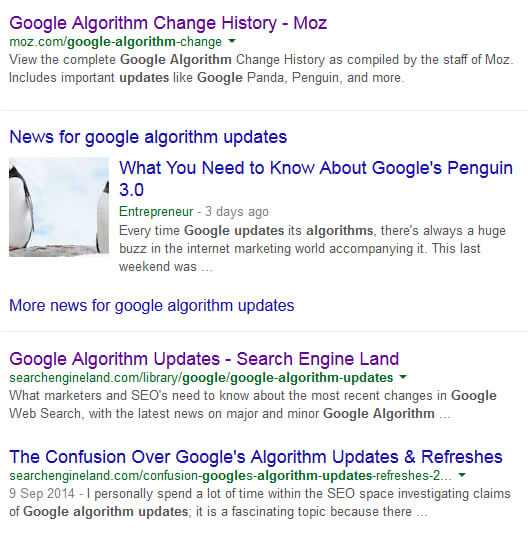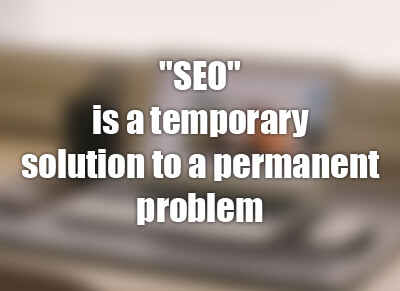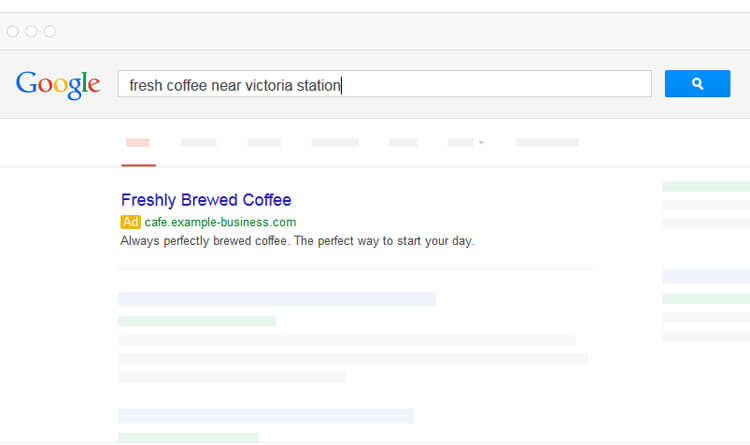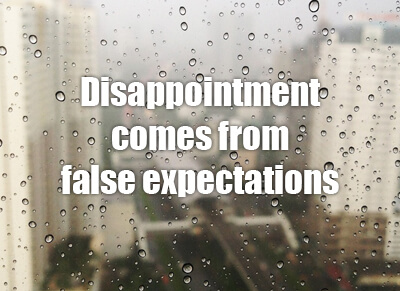The world’s best known webpage has a mesmerising monopoly on commerce and communications, which is a big problem for us small businesses.

Since launching in 1998, a simple white webpage with a primary colour logo has catapulted founders Larry Page and Sergey Brin to folk hero status and unimagined riches.
Idolized by nerds and coveted by anyone with a website, the word “Google” has entered modern vernacular.
The fact these technology conglomerates have so easily slipped into common parlance presents a big problem for small businesses.
“Why is My Website Not Showing In Google?!”
Ever since Google launched, it has played a never ending game of cops and robbers with the types of people who want quick success at any cost. This has made it continuously difficult for everyone else wanting to attract some of that Google love.
If you’re dreaming of search engine glory (who isn’t?) and you believe just having a website is enough to get a good position, you’re mistaken.
Badly designed websites can fall foul of the Google Webmaster Guidelines, so, when creating your site, you need to make sure you comply with the basics to avoid any kind of penalty.
As more algorithm updates are released, the search engines are becoming seriously problematic.
I’m Feeling Lucky I’m Feeling Unlucky
One of the reasons your site does not rank today is because of what some unscrupulous webmaster did yesterday, and the day before that, and the day before that right back to 1998.
It is the best known narrative within the digital marketing sphere.
We live in a world where capitalists seek to tip toe around the rules of the system, and sailing close to the wind for profit where search engines are concerned is nothing new.
Every new bit of marketing technology is exploited and because of this, it becomes harder to succeed. Earlier adopters typically get in early and funnel the easy web traffic into owned media like an email newsletter.
There are more competitors entering the online space and this accounts for the fluctuations you have witnessed.
As of September 2014, there are well over 1 billion sites online.
A Common SEO Story…
The most common story between clients and search agencies is that a business will hire a consultant who they believe can “sort out” their site and make it “rank high”.
The business owner usually thinks that if they pay enough money, some whizz kid will gaze into a crystal ball, wave their magic wand and pull something out of their hat.
Surely, there is a way to just cheat and jump the queue?
Yes, around 2000, you could get away with tweaking the website keywords to get results. You could use cheeky methods to fake popularity. It was once easy to game the system.
It doesn’t work like that anymore.
In many cases, the black hat approach can get you a Google penalty for what is perceived as manipulation.
Consider this: if you look for shortcuts you are going up against a multi billion dollar corporation with all their tech boffins. Do you really want to spend the rest of your life engaged in hand to hand combat trying to be one step ahead?
If you hire someone to build you this kind of mouse trap, someone else will move your cheese.
“SEO Agencies will be Dead and Buried”
In early 2014, after a big search update, a rumour was circulated claiming a Google technician had (Off the record) indicated the direction the search giant is headed.
The quote that was published is “SEO agencies will be dead and buried within the next few years”.
The thing is, SEO will probably always exist in some form, but it will evolve and it will be harder and harder to cheat.
A Greater Burden of Proof
As a webmaster or business owner, the chances are you want to see your site ranking highly. Given the state of the search engines today (and I do mean Google) it’s as though you’re guilty until proven innocent.
Building authority with Google takes time and you need to demonstrate your site is worthy of achieving a decent position against your competitors.
Sadly, business owners overlook the simple truth about what it is their audience want by complicating matters with silly SEO schemes.
The other side of the coin is that the standard for website quality is being raised all the time and forces us to continually innovate.
Some people get lucky and rank without any real effort, but this is often short-lived and what comes next for that webmaster is a rude awakening.

The internet is always buzzing with debate over Google’s latest changes and how to improve our websites
What Makes a Website Rank?
You can find this information anywhere online so do not take this as a huge revelation.
Two Things: On Page Factors and Off Page Factors
The rankings take their cues from two main factors:
- What exists on your website pages.
- What exists off your website pages (but in the periphery).
On Page Factors
On page website factors include URLs, design, code, architecture, navigation, load time, words, images, links, anchors, headings, titles, meta and social media.
These are the basics. There is no dark art to any of this.
Useful Content
Writing relevant, authoritative content on pages is a legitimate way to properly incorporate keywords, key phrases and passages of text that your audience may be searching for.
Again, this is a basic, entry level requirement meant to satisfy website visitors first, and search engines second.
This is not about overloading or stuffing keywords – this will just hang a lantern on your site for all the wrong reasons. It WILL get your site in trouble later if not sooner.
Develop content to demonstrate problem-solving abilities.
Promote these pages manually, independent of the search engines. Can you advertise your pages in a newspaper or magazine? Can you set up marketing funnels on different channels to get visitors on your site?
Reputation
Building up a site as a useful resource for your own audience is how a site eventually begins to earn a worthy reputation.
Think of customers first and search engines last.
Obviously, you should be following search engine best practice from the beginning but this marketing method shouldn’t dominate your thoughts.
A quality, information-rich website is a worthy goal and this is what helps to eventually build those rankings.
Language, Spelling, Grammar, Formatting
Check your content for proper spelling, punctuation, grammar and spacing.
While these attributes do not give a whole lot of weight to the search ranking reputation, these are still subtle indicators of trust and authority.
It is amazing to see what people think is acceptable as written content on their site.
Appalling low standards with childish spellings serve only to undermine the credibility of what you are saying to the reader.
If you are a UK website, pay attention to British spellings such as recognise Vs recognize. This is common sense and might act as a subtle indicator to search engines. That is only speculation though.
Appealing to the reader goes a long way towards search engine success.
- Make sure all written content is pleasing to the eye
- Use plenty of line breaks, bullets, indents, headings, underlines, bold and italic
- Make the content easy to consume, attention-span-friendly and skimmable
Research
Conducting keyword research using the Google Adwords Broad Match Keyword Planner can give you indications of what advertisers are spending with Adwords campaigns.
This gives you some competitive insight if you are brainstorming about what content to publish on the web pages.
BUT if you know your business well (hopefully you do) you can devise material you know your audience will love based on conversations you have with clients and prospects.
Content that resonates with individuals can do wonders for your brand and obviously helps search engines rank it higher if there are lots of clickthroughs and page dwell times.
Minimum Requirements
Getting the basic stuff right is an entry level minimum viable product.
Even things like a website privacy policy, terms, cookie consent functionality and contact details on every page help the engines take you seriously.
Anything less is something Google possibly considers untrustworthy. They have a page you should read about spammy or thin content.
If producing proper pages with relevant rich content is not something you’re prepared to do, ask yourself another question: “Should I be running a website at all?”
Off Page Factors
Off page factors are influencing metrics not on the website itself but which still count towards popularity.
These off page factors are harder to achieve, whereas on page is more about tweaking your web pages.
There is a brilliant article here about off page by world renowned Search Engine Land.
Backlinks from Other Websites
A big off page influencer of website popularity is backlinks. These are acquired by getting other relevant, quality websites to link to you and create a backlink profile.
Google sees this as a vote of confidence and a measurement of popularity.
Their algorithm has always been link based but commentators speculate it could be dramatically different in the future because links are the things people try to engineer themselves. Backlink acquisition is the gold dust driving search engine success.
Backlinks from Social Media Profiles
Well, when those webpage social shares are created across networks like Facebook and Twitter, the person who shared the page is essentially creating a backlink in their network.
These social links can be shared over and over creating more backlinks.
Here’s the bad news: unfortunately, these backlinks carry less weight then a regular backlink on a website (they’re known as “no follow” backlinks).
Here’s the good news: social backlinks can still refer traffic to your site if people visit those links. Google often crawls these links and you can find social status updates appearing quite high in the search engine results, which is an indirect way of ranking your webpages by piggy backing off of the high authority of the social media websites.
Link Building Challenges
In recent years, link building has become a mechanical, automated process with an ever diminishing return.
Rather than earn links, people try to quickly build links themselves and more often than not, screw up. They usually succeed in earning a Google penalty.
Links from low quality SEO directories is part of the search engine problem because many sites in the past have outsourced their link building to low priced link farms in India and South Asia.
If you do want to stand a chance of appearing in search results, you must attract QUALITY backlinks, and to get backlinks you need to create expert quality material for your site worthy of being linked in the first place.
The old strategy of guest posting for links got hit hard in January 2014 when the head of Google’s Webspam team Matt Cutts rattled his sabre on the guest post situation.
The trust Google places in links as a serious popularity indicator is becoming challenging to say the least.
Leaders in the field of SEO are now using phrases such as “outreach” to advocate strategies to solicit links through relationships and reciprocity to get these backlink placements. Money often changes hands. The cash incentives for backlinks is frowned upon because it is one of the ways of gaming the system.
Whether it’s paid or organic, backlink acquisition is a lot of work in itself and needs a plan.
Google Plus Local (Now Known as Google Business Profile)
Some of the more easily implemented off page strategies are things like setting up a Google Business Profile.
If you can ensure it is linked in the back end, Google will be able to see you have merged your site with a Google Plus Local page.
Local Business Directories
On the subject of local directories, have you submitted your business details to the free business listing sites in the Derby and Nottingham area?
This is a good first step you can take on your own, and quite often, when searching local business keywords, we see these listings pop up here and there.
Some local directories give backlinks too, but be careful. Only submit to what appear to be high quality, relevant directories. It is best to keep them geographically related.
Organic Vs Paid
Google’s history is interesting. It monetized in the early 2000’s after launching the Adwords Pay Per Click system, a legitimate way to dodge the organic competition on page 1 of Google.
There’s nothing wrong with paid advertising IF you have a strategy, a budget and someone to manage your campaign. But most of us do not have that luxury and are seeking alternatives.
The cynical search engine commentators believe the endless Google algorithm adjustments are coercing disgruntled webmasters into paid Google Ads.
When push comes to shove, it seems reasonable to say Google would quite like it if you dug deep and forked out for paid adverts. We’re all playing in Google’s sandpit.
What Do You Want?
What you want and what you need from your business website are worth examining.
Are you still subscribing to an out-dated search engine paradigm? Or do you see Google for what it is?
You might want to rephrase the question and consider the business fundamentals:
- What do my customers want?
- What do my customers need?
- How can I deliver value?
A great website with a problem solving angle is what you should want for your customers. This is what wins business and makes everyone happy.
Set Proper Expectations
If you hire a designer to build you a site, and it does not rank, this is your responsibility, not the designer’s.
If you’re looking for someone to blame, remember what Google is and what they do with their algorithm.
We as businesses cannot honestly expect to rely on organic search traffic as a realistic means of success. It is gambling.
The truth is, search engines are extremely unstable.
- Are you prepared to take those risks?
- Do you have a solid plan?
- Do you just want search rankings or business growth?
Search Engine Disappointment Comes with a 20 Year Guarantee!
Without a plan and consistent implementation you are unlikely to achieve high rankings because that prize will go to the business busting a gut to market themselves.
But even THEY might be in for a shock next time Google changes the goal posts!
Summary: Write Good Stuff, Have a Strategy, Diversify Marketing Channels
Your marketing strategy should never rely on just one platform, or just one approach.
It’s nice to get search engine traffic, and if it’s there, take it and funnel that traffic into your mailing list and social media channels. Do something with it.
But if you have a good ranking at present, don’t get too comfortable because you are likely to become comfortable on what is an overleveraged business position, albeit a technical marketing one.
Google is the problem child of the marketing family. You must anticipate the tantrums it throws and make provision to diversify.





